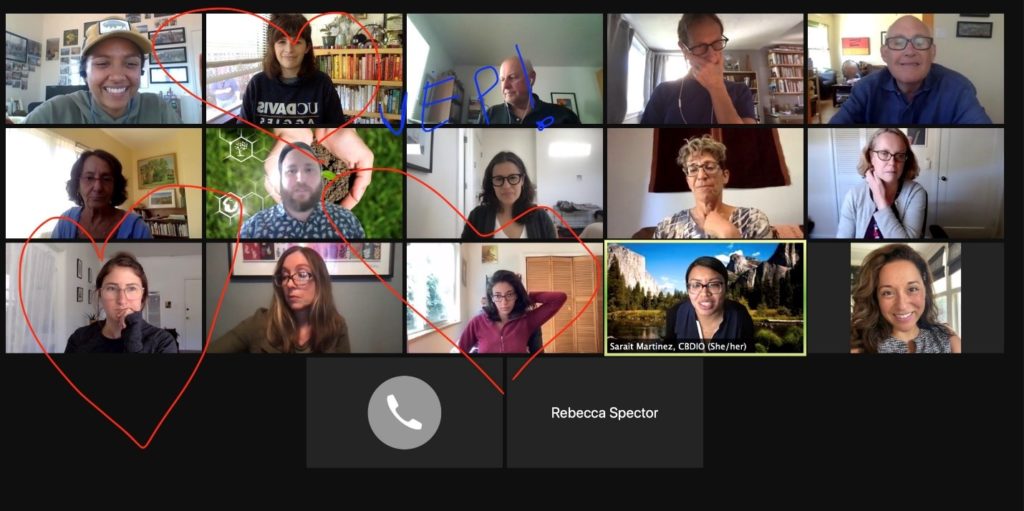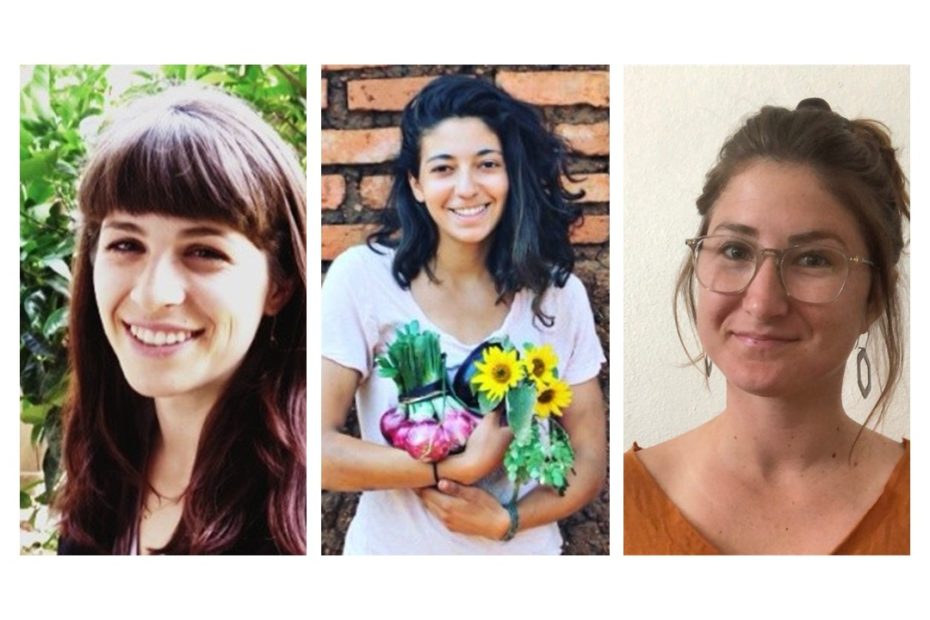UEP alumni span far and wide in both where they live and the work they do, but these three alumnae happened to find themselves working together on food and agriculture policy in California. After learning together at UEP, Becca Lucas (UEP & Friedman, 2019), Jamie Fanous (UEP & Friedman, 2018), and Tessa Salzman (UEP & Friedman, 2018) have found themselves working together, meeting near-daily on Zoom. Becca and Tessa work at the California Climate and Agriculture Network (CalCAN), while Jamie is the Policy Advocate for the Community Alliance with Family Farmers (CAFF), an organization that is part of the CalCAN coalition. Together, the three of them have been collaborating with other food and agriculture advocates across the state on AB 125, a bill that would put a $3.3 billion bond for food and farm system resilience before California voters on the 2022 ballot. In the conversation below, Becca, Jamie, and Tessa tell us about how they’re working together on this proposed policy.
Can you describe your current roles and your career path since UEP?
Tessa Salzman: I’m the Field Organizer with CalCAN, the California Climate & Agriculture Network, where I organize with farmers and food system advocates around the state to elevate a strong, collective voice for climate smart agriculture in Sacramento. I’ve been there since February 2021, after working in food sourcing for a for-profit company and then for the food bank of Ventura County where I live. As Sourcing Director at the food bank, I saw firsthand the wide ranging issues in our food system, from food production and labor to health, food waste and accessibility. This all led me back to wanting to work from a more systemic lens on policy solutions.
Jamie Fanous: I am the Policy Advocate for the Community Alliance with Family Farmers (CAFF). I advocate for small-scale farmers in the state of California and focus on policies that center equity and address the needs of small-scale and underserved farmers. I work on things like, getting government funding to support technical assistance to ensure small-scale growers gain access to COVID-related funding.
After graduating from UEP, I did some analyst work on climate change issues and then became a technical service provider where I worked directly with farmers, providing education on sustainable practices that improve soil health like cover crops or support farmers with grant applications. I saw the barriers firsthand in that space, but during the pandemic I felt the need to shift back to policy and joined CAFF in January of 2021.
Becca Lucas: I am the Communications and Operations Manager for CalCAN, so Tessa and I get to work together all the time, which is super fun. CalCAN is a coalition and CAFF—where Jamie works—is one of our coalition members so sometimes we have policy committee meetings were all three of us are in attendance with our other colleagues.
I graduated in 2019 and during my last year I was teaching cooking classes at the Boston Public Market and a teaching assistant for the UEP Negotiations course. I moved back to California in September and then started at CalCAN in November of 2019, four months before the COVID shut down. That was a really interesting time to start my job and I haven’t yet had a “normal” year for policy at CalCAN.
How have you been working together across these two organizations?
Tessa: In general, we work together to get aligned on our policy priorities and position statements. CAFF is its own independent organization and also a coalition member of CalCAN so some, but not all, of our policies agendas directly overlap. The majority of our work is on state level policy and federal will increasingly make more sense in the post-Trump era.
Becca: As the Policy Advocate for CAFF, Jamie’s kind of like our sounding board in the approval process. She and the policy director join meetings to inform how CalCAN decides to take positions on bills related to agriculture and climate.
Jamie: CalCAN ultimately has more capacity to do policy work so we at CAFF rely on CalCAN to support us on things that we can’t do ourselves, like sustainable agriculture. We are often on Zoom calls working together. For example, in meetings I might write notes and Tessa facilitates—that’s our life in a very practical way and it’s pretty great.

You’ve been collaborating on a California state bill, AB 125—tell us about this policy.
Tessa: Since Jamie and I joined CAFF and CalCAN our collaboration has been on this specific policy, AB 125. We call it the Food and Farm Resilience Bond for short. We’re working with a much larger coalition of 15 organizations on that bill so that’s been a huge endeavor and really exciting to be working on it with fellow UEP alums and friends.
Becca: This story goes back quite a few years. There’s been this loose group of organizations in California, including CalCAN and CAFF, that’s been working for a while on various ways to address climate change through agriculture practices and infrastructure. In spring 2020, we published recommendations on how investing in the food and farm system would support the economic recovery from the pandemic, right as we were all grappling with the most immediate impacts.
The recommendations fell in three categories: 1. Invest in diverse, more resilient agriculture systems, 2. invest in regional and local food infrastructure and 3. invest in our essential food system workers (including farmworkers) and most vulnerable communities.
Most recently, in late fall and early winter the scope grew and so did the organizing groups. In recent years, there have been multiple climate bonds proposed to the California legislature, but all of them got stalled at the beginning of the year last year due to COVID. All of these climate bonds, however, did not have sufficient funding for agriculture resilience. So, to get the funding we needed for these food and farm system initiatives, we wanted to develop a bond proposal ourselves and formally became a coalition with governance agreements, decision making powers, subcommittees etc. The bill now covers four main buckets of investment: farmworker health and safety; combatting hunger; agricultural sustainability; and regional food infrastructure. Since the bill was introduced, we had bipartisan support in the California Assembly Agriculture committee and over 160 organizations in support of the bill. It’s since stalled in committee hearings, due to COVID, but we’re pivoting to different options now.
It sounds like COVID-19 has had a major impact on your work and the policy focus of your organizations.
Jamie: There are logistical things that the pandemic has impacted, like conducting policy engagement over zoom instead of in-person, but the bigger impact that the pandemic has surfaced are the societal inequities in the food and agriculture sector. One major shift was a result of the Black Lives Matter movement, which I think has shaken the food and agriculture community. Many white-led nonprofits are really reckoning with racial inequity, and it’s been hugely valuable over the last year.
The same thing goes for the legislation, it has become more important to many members that there is representation and prioritization of historically underserved farmers.
Becca: As an example, typically, CalCAN focuses on bills at the nexus of climate and agriculture. But this year, based on all these conversations about racial equity, our policy agenda has been expanded to include racial justice, social justice, and equity issues that intersect with climate change or agriculture. This year, our policy team prepared their usual memo on which bills we plan to support and for each policy, the team wrote a bullet point on how would it advanced racial or social equity and justice and explicitly address those issues within policy. The team considered these things internally before, but now it’s being put up front and center.
Hear more reflections from Becca (becca@calclimateag.org), Jamie (jamie@caff.org), and Tessa (tessa@calclimateag.org) on their time at UEP and how COVID has impacted their work in an upcoming UEPodcast. All three are happy to connect with UEP students and alum via email.
Read the previous profile in this series on Tony Lechuga here and Holly St. Clair here.
